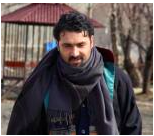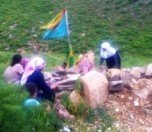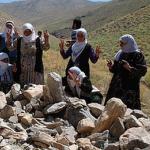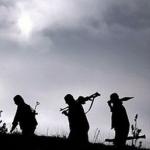Gendarmerie Admits Killing, Disappearance

A gendarmerie document presented to the court regarding the case of a mass grave belonging to PKK guerrillas from 1998 admits the killing of 22 PKK guerrillas. While PKK sources claim the death toll as 27, the funerals have not been returned to the families since then.
“If the funerals are not returned to their families or officials, it means that their disappearance is admitted,” advocate Turan Ece
The aforementioned document was presented in Çatak District Peace Court on Wednesday on the sixth hearing of the “Mass Grave” case, claiming that 14 “obtained dead” guerrillas were citizens of Syria.
The document also cites the names of the soldiers who took part in the military operation as “witness”, however no further investigation was made.
They recognized them as “Syrians”
Below is the document dated 23 September 2013, enlisting the names and inventory of 22 PKK guerrillas “obtained dead” .
While the document only cites the full name of one guerrilla, Abdurrahman Malgaz, other names turn out as “nom de guerre” with country of origin - mostly from Syria.
On the other hand, advocate Ece claimed that the document didn’t represent the truth as some of the guerrillas said to be from Syria were indeed from Turkey. The names on the list also contradict with PKK sources.
Advocate Ece also added that an independent forensics institute should carry out the investigation as two sources contradicted.
Forensics Institute report being awaited
On the other hand, a report expected from Istanbul Forensics Institute have yet to arrive to the court. Advocate Turan Ece requested for additional time and a notice directed to the Forensics Institute.
“As PKK changed the location of the grave, no skulls or big bones were retreated,” he said.
The next hearing was set May 6.
What had happened?
22 guerrillas, according to official sources, and 27 according to Kurdistan Workers’ Party (PKK) lost their lives in the armed conflict on October 12, 1998 between Turkish Armed Forces (TSK) and the PKK in Van province Çatak district’s Kayaboğazı village Görentaş highland. The families of the guerrillas’ did not receive their funerals.
The families, upon finding out in July 2011 about a mass grave in Çatak, applied to the Human Rights Association (İHD) Van Branch thinking their own children could be there. The Arduç family went to İHD Van branch on October 4, 2011, and the other families on August 11, 2011.
İHD attorneys applied to the Çatak Chief Public Prosecution and requested, "the mass grave to be opened with the help of the public, a DNA test to be conducted, and the bones thought to belong to their relatives to be delivered to them.”
Çatak Chief Public Prosecution ruled “lack of legal grounds for prosecution” on August 24, 2011, stating the requests to be “within civil court jurisdiction.” Erciş High Criminal Court affirmed the decision.
The incident was carried to the ECHR. The court evaluated the families’ application and inquired in their declaration dated March 20, 2013 whether the case closed due to “lack of legal grounds for prosecution” had been carried to civil courts.
Attorney Ece applied to the Çatak Peace Court on April 26, 2013 following the ECHR’s statement and launched a case. The first hearing took place on May 14, 2014. On June 25, that year, an excavation was made on the field, authorities reached some bones and relics. While the samples were sent to the Forensics Institute, a reply is being expected. (AS/BM)
* Click here to read the article in Turkish.
bianet submits shadow report to UN Human Rights Committee

Imprisoned lawyer exposes use of disciplinary investigations to pressure political prisoners

Tap water ‘smells of bleach’ in Muğla prison

Censorship on a letter from prison describing hunger

Prisoner on hunger strike: 'I am alone without sunlight'









